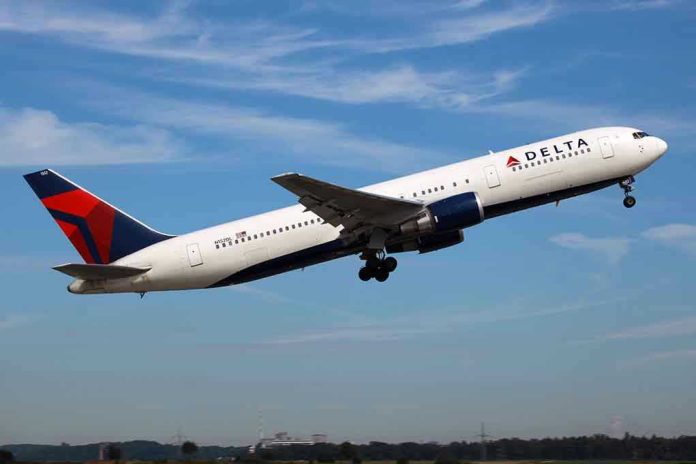
One intoxicated passenger’s violent outburst in a Salt Lake City airport aisle is now a cautionary tale for every traveler, every flight crew, and every airline executive wrestling with how to keep the skies—and the ground—safe from unpredictable danger.
Story Snapshot
- A Delta employee was physically and sexually assaulted by an allegedly drunk passenger before a flight out of Salt Lake City International Airport.
- The accused, Cody Sierra Marie Bryne, attempted to flee and resisted arrest, leading to multiple charges and an ongoing investigation.
- The incident highlights a rising trend of alcohol-fueled disruptions and the risks faced by airline staff in the post-pandemic era.
- Airlines are doubling down on zero-tolerance policies and re-evaluating approaches to alcohol service and passenger screening.
Alcohol-Fueled Chaos at the Airport: What Happened and Why It Matters
Salt Lake City International Airport, October 2, 2025: Cody Sierra Marie Bryne, age 31, refused to move from the aisle during boarding for a Delta flight to Portland. The pilot ordered her removal. In the airport’s secure area, Bryne allegedly turned violent, grabbing a Delta employee’s neck and hair, twisting her breast, and delivering a verbal threat. This wasn’t just disruption—it was a physical and sexual assault that upended the boarding routine and left staff traumatized.
Who is Cody Sierra Marie Bryne? Drunk passenger accused of assaulting Delta worker, others at Salt Lake City airporthttps://t.co/VruhYDla1s
— Hindustan Times (@htTweets) October 5, 2025
After the initial confrontation, Bryne tried to escape airport authorities by booking another flight. Law enforcement caught up with her, but not before she resisted arrest, further complicating the ordeal for police and airline staff. She was eventually booked into Salt Lake County Jail, facing severe charges: sexual battery, assault, interfering with police, and public intoxication.
Delta’s Zero-Tolerance Policy Faces a Real-World Test
Delta Air Lines responded swiftly, reiterating its zero-tolerance stance on abusive, disruptive, or unlawful behavior. The company underscored that staff and passenger safety will never be negotiable. This incident is not isolated—since the pandemic, the U.S. airline industry has seen a spike in unruly passenger incidents, many linked to alcohol. Assaulting crew is a federal offense, and the FAA enforces fines up to $37,000 for interference. Bryne’s case is a flashpoint, bringing these policies to the forefront just as the industry faces mounting public scrutiny.
Salt Lake City Police and airport authorities are still investigating. Details from police affidavits describe Bryne as visibly intoxicated and combative, refusing to comply with officers at every step. Her actions, and the subsequent response, have set a new bar for what airline staff and law enforcement must prepare for as travel rebounds and tensions rise in crowded terminals.
The Growing Threat: Alcohol, Airports, and Airline Safety
This episode is not an isolated anomaly. Since the COVID-19 pandemic, reports of disruptive, intoxicated passengers have surged. Airlines and the FAA have responded with stricter screening, heightened penalties, and better staff training. Yet, the risks to airline personnel remain acute. Assaults—both physical and sexual—are rare but devastating, and they cast a long shadow over the industry’s return to normalcy.
The ramifications are severe for everyone involved. For the assaulted Delta employee, the trauma lingers. For passengers, flights are disrupted and confidence is shaken. For airlines, legal costs rise, operational delays increase, and the imperative to protect staff becomes urgent. For Bryne, the consequences are immediate and long-term: criminal charges, potential jail time, and public scrutiny.
What Happens Next: Policy, Industry, and Cultural Shifts
Authorities continue to investigate, and Delta’s zero-tolerance message is clear: abusive behavior will be prosecuted to the fullest extent. The industry is now grappling with questions about alcohol service, passenger screening, and staff protection. Some experts advocate for stricter pre-boarding checks and reduced alcohol availability. Others call for public deterrence through high-profile prosecutions and more robust support for victimized staff.
The broader airline sector is watching closely. The trend of rising in-flight and pre-flight disruptions has already led to policy changes; this case may accelerate more. American values—personal responsibility, respect for law enforcement, and common-sense safety—demand decisive action. Every passenger and employee deserves a safe journey, on the ground and in the air. This case is a warning and a wake-up call: zero tolerance is not just a slogan, it’s a necessity.






